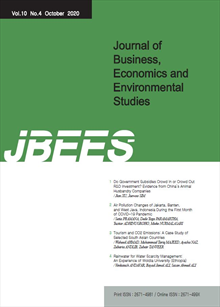간행물
The Journal of Business, Economics, and Environmental Studies KCI 등재

- 발행기관 한국유통과학회
- 자료유형 학술지
- 간기 계간
- ISSN 2671-4981 (Print)2671-499X (Online)
- 수록기간 2011 ~ 2020
- 주제분류 사회과학 > 경영학 사회과학 분류의 다른 간행물
- 십진분류KDC 325DDC 330
권호리스트/논문검색
Vol.4 No.4 (2014년 10월) 5건
1.
2014.10
서비스 종료(열람 제한)
Purpose – The paper aims to study strategic enterprise resource initiative formation processes. It analyzes the process of managing the strategic resource initiative and discusses its implementation mechanism. A research model for enterprises’ strategic development is proposed, which suggests a geometric interpretation for estimating a company’s long-term development.
Research design, data, and methodology ‒ The analysis employs theoretical studies of modern researchers. The main models used to determine the optimal alternative business strategy are graphic interpretation and mathematical modeling.
Results ‒ The hypotheses testing demonstrates the definition of a company’s strategic resource initiative and explains themechanism or design of its formation. The study presents a geometric prism-refraction model of practice using a strategic resource initiative.
Conclusions ‒ An enterprise’s strategy could return to its initial state in case of its unexpected deviation as a result of passing through the nodal points. The proposed model allows us to evaluate business performance, its surrounding environment, and the resource management strategy, to determine the necessary scope of strategy changes necessary to bring it back to the original state.
2.
2014.10
서비스 종료(열람 제한)
Purpose ‒ This study aims to analyze changes in attitudes towards women's political leadership and the social factors related to such changes. The study reviews the field of women's political leadership, specifically the political and economic participation of women in the world, and the impact of variables such as the changes in attitude on such participation. Research design, data, and methodology ‒ The population for this study comprises 99 countries that are members of the United Nations and have participated in the third and fifth waves of the World Values S urveys. The sample consists of 31 such countries selected for sampling. Results ‒ This study is a secondary analysis to examine the hypotheses regression and the LISREL model are used. The findings of the study indicate that the correlation between two variables, namely women's political participation and leadership of women, is statistically significant. Conclusions ‒ The changing rate of women's economic participation is also significant. The significance of these coefficients indicates that the results, with a 95% confidence level, can be extended to all member states.
3.
2014.10
서비스 종료(열람 제한)
Purpose ‒ The study is primarily aimed at framing "Position Descriptions" for some key positions in the executive cadre of the testing department of CESC Limited. Research design, data, and methodology ‒ The questionnaire, interview, and observation methods have been used for the purpose of data collection. The position descriptions are validated by superiors belonging to the respective departments. Results ‒ It has been found that there is overlapping of job duties and job responsibilities in the department. This overlapping is quite alarming for the organization and may even become a hurdle in the path of its progress. It can be seen as a classic case of de-layering. Conclusions ‒ The study concludes that good communication along with interpersonal and negotiation skills are absolutely essential to facilitate the performance of the day-to-day duties of a job, including handling the union, solving IR related issues, development of the subordinates, job setting, distribution and allocation, etc. Position descriptions will help in the alignment of the employee direction, and can be a useful tool to aid the communication between management and employees.
4.
2014.10
서비스 종료(열람 제한)
Purpose – The study aims to investigate empirically the effects of the flow of an Internet shopping mall upon consumers' revisit intention and purchase intention. Research design, data, and methodology – The subjects comprised customers of Internet shopping malls. SPSS 19.0 for Windows was used to verify the models and hypotheses. Frequency, factors, reliability, and regression analysis were used. Results – This study classified flow behavior factors of Internet shopping malls into four categories-skills, convenience, design, and mutual reaction-to investigate their influence on flow. Skills and convenience had a greater influence than mutual reaction and design. The flow was most influenced by convenience, followed by skills. Conclusions – First, the subjects comprised those who had made purchases at least once at an Internet shopping mall. Second, the study applied the common flow attributes of past researchers to the Internet shopping mall environment, to gauge customers' e-commerce involvement. Third, skill, convenience, and shopping mall display design affirmatively influenced the computer-mediated environment from the Internet marketing control implications perspective regarding the contents of the marketer’s website.
5.
2014.10
서비스 종료(열람 제한)
Purpose – This study classified consumers' value inclination to find out ways to enhance consumers' eco-friendly product purchase intention. Further, it verified the differences among eco-friendly product purchase intentions depending upon value inclination. Research design, data, and methodology – The structured model and hypotheses were established, and 202 copies of effective questionnaires were used. In order to verify the hypotheses, we used single regression analysis, multiple regression, 3-step mediating regression, and path analysis. Results – Individualism had a positive influence upon materialism, need for uniqueness, and face wants, and collectivism had a positive influence upon materialism only. Factors of self-expressive consumption inclination had a positive influence upon eco-friendly product purchase intention, and factors of value inclination also had a positive influence. Finally, self-expressive consumption inclination mediated between value inclination and eco-friendly product purchase intention. Conclusion – Consumers with individualism inclination felt the need to connect the ownership of an eco-friendly product with their extended self and, further, it was clear that not only the government but also enterprises should build up their public image regarding eco-friendly products.

